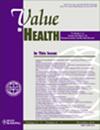用于早期阿尔茨海默病治疗健康技术评估的新 IPECAD 开源模型框架:开发与用例。
IF 4.9
2区 医学
Q1 ECONOMICS
引用次数: 0
摘要
目的:阿尔茨海默病(AD)新疗法的报销决定需要通过经济评估来确定。具有直观模型交叉验证结构的开源模型可提高此类评估的透明度和可信度。我们介绍了新的 IPECAD 开源模型框架(第 2 版),用于早期 AD 治疗的卫生经济评估,并将其用于交叉验证和解决不确定性问题:方法:通过复制现有参考模型并测试其内部有效性,开发了一个使用分类复合领域(认知和功能)的队列状态转换模型。然后,对现有的评估莱卡奈单抗治疗的 "ICER "和 "AD-ACE "模型进行交叉验证。此外,还对试验疗效结果选择、疾病自然进展、治疗效果减弱和停止规则以及其他方法选择进行了不确定性假设。该模型以 R 代码、电子表格和网络版的形式开源,可通过 https://github.com/ronhandels/IPECAD.Results 获取:在 IPECAD 模型中,与 ICER 模型相比,增量生命年、QALY 收益和成本节约减少了 21-31%,与 AD-ACE 模型相比,减少了 36-56%。IPECAD 模型的结果对治疗效果减弱和停止规则的假设以及试验疗效结果的选择尤为敏感:我们展示了新的 IPECAD 开源模型框架的能力,研究人员和决策者可以交叉验证其他(提交 HTA 的)模型并进行额外的不确定性分析,为 AD 决策模型的开放科学树立了榜样,并为重要的报销决策提供了支持。本文章由计算机程序翻译,如有差异,请以英文原文为准。
New IPECAD Open-Source Model Framework for the Health Technology Assessment of Early Alzheimer’s Disease Treatment: Development and Use Cases
Objectives
Reimbursement decisions for new Alzheimer’s disease (AD) treatments are informed by economic evaluations. An open-source model with intuitive structure for model cross-validation can support the transparency and credibility of such evaluations. We describe the new International Pharmaco-Economic Collaboration on Alzheimer's Disease (IPECAD) open-source model framework (version 2) for the health-economic evaluation of early AD treatment and use it for cross-validation and addressing uncertainty.
Methods
A cohort state-transition model using a categorized composite domain (cognition and function) was developed by replicating an existing reference model and testing it for internal validity. Then, features of existing Institute for Clinical and Economic Review (ICER) and Alzheimer’s Disease Archimedes Condition-Event Simulator (AD-ACE) models assessing lecanemab treatment were implemented for model cross-validation. Additional uncertainty scenarios were performed on choice of efficacy outcome from trial, natural disease progression, treatment effect waning and stopping rules, and other methodological choices. The model is available open-source as R code, spreadsheet, and web-based version via https://github.com/ronhandels/IPECAD.
Results
In the IPECAD model incremental life-years, quality-adjusted life-years (QALY) gains and cost savings were 21% to 31% smaller compared with the ICER model and 36% to 56% smaller compared with the AD-ACE model. IPECAD model results were particularly sensitive to assumptions on treatment effect waning and stopping rules and choice of efficacy outcome from trial.
Conclusions
We demonstrated the ability of a new IPECAD open-source model framework for researchers and decision makers to cross-validate other (Health Technology Assessment submission) models and perform additional uncertainty analyses, setting an example for open science in AD decision modeling and supporting important reimbursement decisions.
求助全文
通过发布文献求助,成功后即可免费获取论文全文。
去求助
来源期刊

Value in Health
医学-卫生保健
CiteScore
6.90
自引率
6.70%
发文量
3064
审稿时长
3-8 weeks
期刊介绍:
Value in Health contains original research articles for pharmacoeconomics, health economics, and outcomes research (clinical, economic, and patient-reported outcomes/preference-based research), as well as conceptual and health policy articles that provide valuable information for health care decision-makers as well as the research community. As the official journal of ISPOR, Value in Health provides a forum for researchers, as well as health care decision-makers to translate outcomes research into health care decisions.
 求助内容:
求助内容: 应助结果提醒方式:
应助结果提醒方式:


